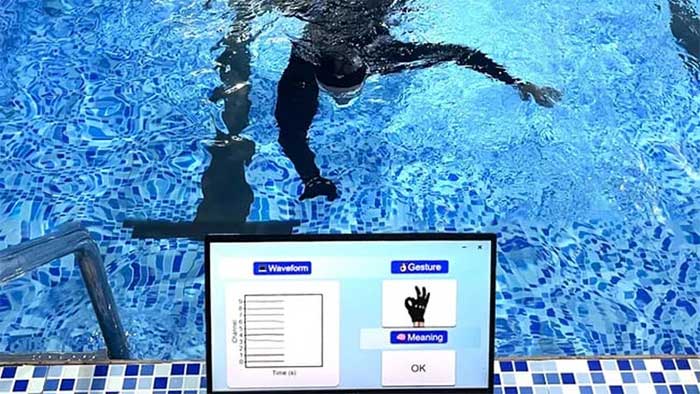Researchers have designed waterproof gloves equipped with sensors that can translate hand gestures into messages, enabling divers to communicate more effectively with an accuracy of 99.8%.
Electronic gloves are not a new concept and are currently under development – for example, to assist stroke survivors in regaining normal motor skills. However, so far, creating an electronic glove that is both waterproof and comfortable to wear has remained a challenge.

In tests, the new electronic glove design could translate 16 hand gestures into words with an accuracy of 99.8% – (Image: Liu et al. (2024), ACS Nano).
To create a glove that responds to hand movements, researchers wrapped 10 sensors in adhesive tape and stitched them into the finger segments and the first joints of the prototype.
With the assistance of a participant wearing the electronic gloves, and supported by artificial intelligence (AI), the research team subsequently trained a machine learning algorithm to recognize the electrical signals corresponding to 16 hand gestures commonly used by divers underwater, including the gesture from the index finger to the thumb to signal “OK.”
When the wearer of these gloves performs hand signals underwater, they generate electrical pulses. These pulses are then transmitted to a computer capable of translating them into words with an accuracy of 99.8%. This could enable more effective communication between divers and those on the surface.
“Currently, basic hand signals between one diver and another work well in good visibility conditions but become more challenging at night or in poor conditions and clearly do not provide good communication with the surface,” Keiron Fraser, an associate professor of marine conservation and head of the scientific diving program at the University of Plymouth in the UK, told Live Science via email.
Fraser was not involved in the glove design. He noted that this design could be particularly useful in activities requiring interaction between divers and the surface.
During explorations, Fraser and his colleagues used a wired or water-transmitted voice communication system, but “this setup is bulky and expensive,” he said.
Waterproof electronic gloves could provide distinct communication channels in sensitive activities – and while the military has technology for transmitting typed messages underwater, “the glove system could be faster than typing,” Fraser said.


















































